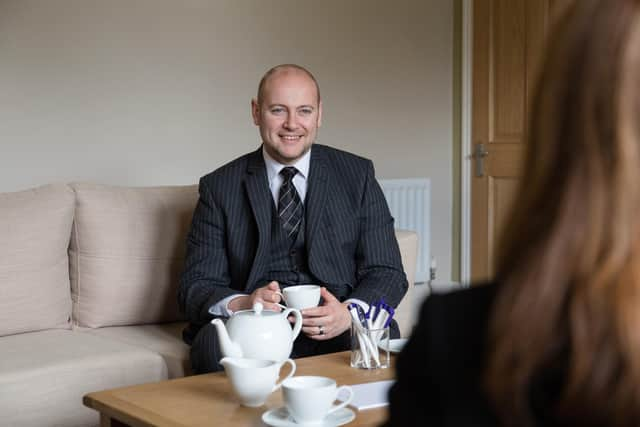Day in the life of a Northumberland funeral director
and live on Freeview channel 276
A profession that depends on tragedy and loss hardly seems an attractive proposition for school leavers. But for Dominic Appleby, who will be 36 this year, it was the obvious choice.
Driven by a personal experience of loss, including the death of his father when aged 10, he has been a funeral director since he was 17 – starting a full-time job a month prior to his 18th birthday.
Advertisement
Hide AdAdvertisement
Hide AdHe has facilitated countless funerals for grieving families across Northumberland. Most of them as part of the William Purves Funeral Directors team in Blyth, having joined the business in July 2007.


When asked about the nature of the job, Dominic said: “It’s very important that funeral directors are good at listening and taking a genuine interest in the people we care for and serve.
“We funeral directors are often forgotten about, but yet can be right amongst it during difficult and tragic times. Covid is the primary example – everything we knew and did changed overnight, but yet we still provided the best service possible.
“Within the William Purves family, I am very proud that we said ‘yes’ in particular to viewing the deceased when so many other businesses were closing and sealing coffins negating the families need to say goodbye.
Advertisement
Hide AdAdvertisement
Hide Ad“I do think though that we as funeral directors need to be better at keeping up to speed with trends and expectations of what society thinks.
“We often seem to be one step behind, unsure of how a change might be received by families.”
A typical day for him always starts with a cup of tea and the first few moments to catch up with colleagues in relation to their plans from the previous night or over the weekend.
As for the rest of it, Dominic said: “We look at if there are new services to arrange for those who may have died in hospital overnight.
Advertisement
Hide AdAdvertisement
Hide Ad“This would entail calling the family to make an appointment to meet with them. This is normally in the comfort of their own home, but we also have the option of meeting within our modern funeral homes. Occasionally we might still use video calling, but not as much as we were during Covid restrictions.
“We also spend time checking over our existing services and arrangements – have flowers been ordered? Is catering needed? Do we need to prepare an order of service?
“No-one knows when a death will occur. The telephone can ring at any time with a family asking for help and informing us that their loved has passed at home.
“After taking first call details – names, addresses and contact details, and confirming if the death has been verified – we would then attend to the house and bring the person into our care at the funeral home. Following this, an appointment would be made to return to the house where the arrangements would be made.
Advertisement
Hide AdAdvertisement
Hide Ad“During an arrangement, we are asking questions to help us create a funeral service that is a fitting tribute to the life of the person who has died; where will the service take place? Will it be a burial or cremation? What about transport – motor hearses or something alternative like horse drawn carriage, motor trike, or a campervan?
“We also need to think about our care and preparation of the person and whether they will be dressed, jewellery instructions, ashes instructions if required, death notices to be written. There is also the ‘red tape’ of documentation to be completed for the relevant burial or cremation authority.
“Other colleagues may be out meeting families who are planning for the future, discussing either a free Plan of Wishes or investing into a pre-paid funeral plan to offset rising funeral costs. These conversations are often ‘lighter’ and easier to discuss options without the distress of the bereavement.
“We also have a dedicated team of embalmers whose sole focus is to treat the person with respect and dignity as they rest in our care in our state-of-the-art embalming room, and are prepared for family and friends to visit and spend time in our chapels of rest.
Advertisement
Hide AdAdvertisement
Hide Ad“The backbone of our day is attending and conducting funeral services. The funeral director’s responsibility is to ensure their team is ready, that final preparations and identification have been carried out thoroughly and that vehicles are ready.
“A funeral ranks alongside some of the most important events in our lives and making sure that all happens smoothly and without stumble is our utmost priority.
“Come the end of the day, we are reading over the next day’s funeral services and calling our clients out of courtesy to ensure all details are ready.
“Our on-call team then cover the telephones for anything that requires immediate attention until the following morning.”
For more information about the services provided by William Purves, go to www.williampurves.co.uk